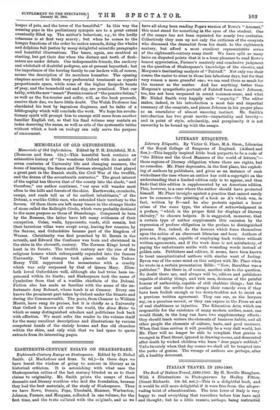EIGHTEENTH-CENTURY ESSAYS ON SHAKESPEARE.
Eighteenth-Century Essays on Shakespeare. Edited by D. Nichol Smith. (J. illacLehose and Sons. 7s. 6d.)—In these days we have learnt the wisdom of going to sources in literary as in historical criticism. It is astonishing with what ease the Shakespearian critics of the last century blinded us as to their claims to originality. Mr. Smith prints the essays of those dramatic and literary worthies who laid the foundation, because they had the best materials, of the study of Shakespeare. Thus we have Rowe, Dennis, Pope, Theobald, Hanmer, Warburton, Johnson, Farmer, and Morgann, collected in one volume, for the first time, and the texts collated with the originals, and as we have all along been reading Pope's version of Rowe's "Account," this must stand for something in the eyes of the student. One of the essays has not been reprinted for nearly two centuries. Collectively they sum up not only the criticism of the essayists who discussed the dramatist from his death to the eighteenth century, but afford a most excellent representative series of the eighteenth-century essay itself. We have split so many hairs on disputed points that it is a keen pleasure to read Rowe's honest appreciation, Farmer's masterly and conclusive judgment on the question of Shakespeare's knowledge of the classics, and Morgann's fascinating analysis of "Falstaff." Not only was their course the easier to steer in those less laborious days, but for that very reason a more graceful One; we can read them as much for the manner as the matter. And has anything better than Morgano's sympathetic portrait of Falstaff been done? Johnson, too, has not been surpassed in sound common-sense, and what Mr. Nichol Smith very happily calls "sagacity." The editor makes, indeed, in his introduction a most fair and impartial summary of the essayists, and places Johnson in his proper place as an emendator of almost unerring instinct. Mr. Smith's introduction has two great merits—impartiality and brevity— and in point of style, scholarship, and perspicacity it is not unworthy to be bound up with the essays.






















































 Previous page
Previous page